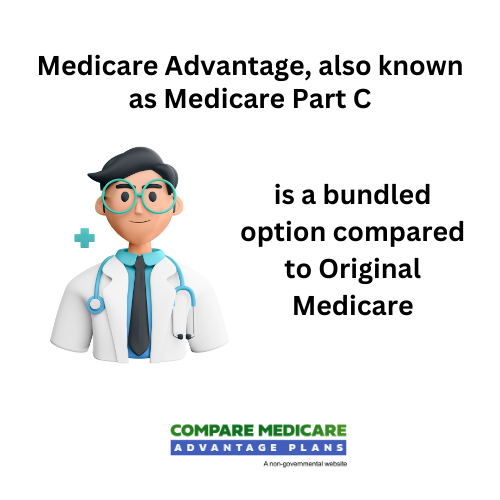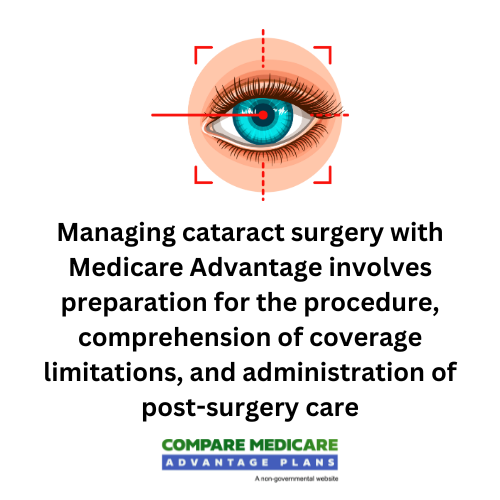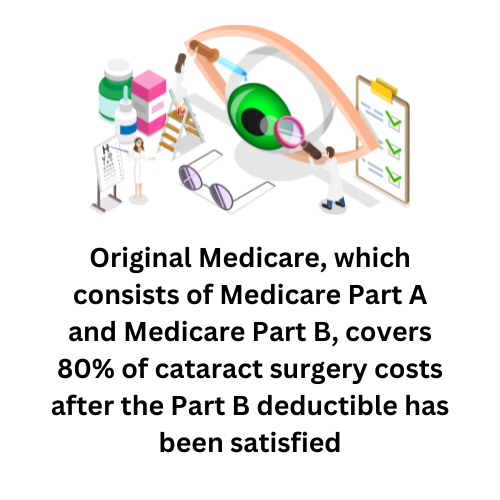Do Medicare Advantage Plans Cover Cataract Surgery?
Cataract surgery may be an essential procedure for many aging individuals, but understanding insurance coverage might be confusing.
Medicare Advantage, a potential alternative to Original Medicare, will likely provide coverage for many healthcare services, including cataract surgery.
So, what exactly does Medicare Advantage cover when it comes to cataract surgery, and what potential costs may be involved?
Key Takeaways
- Some Medicare Advantage plans may cover cataract surgery, but the extent of the coverage may vary.
- Alternatives such as Original Medicare and Medigap could be available to cover costs that may be associated with the procedure.
Compare Plans in One Step!
Enter Zip Code
Medicare Advantage and Cataract Surgery Coverage
Medicare Advantage plans, provided by private insurance companies, consolidate hospital, doctor, outpatient, and potentially drug coverage.
Certain plans may cover cataract surgery, though coverage extent may vary by plan.
For older individuals, particularly due to the prevalence of cataracts with age, familiarity with Medicare Advantage plans’ coverage could be beneficial.

Surgical intervention for cataracts will likely become necessary when visual impairment cannot be remedied with a higher-powered eyeglass prescription. Laser cataract surgery entails the removal of the lens and its potential substitution with an artificial lens.
When considering cataract surgery and potential Medicare Advantage coverage, understanding the fundamentals of these plans, the possible variations in coverage, and effective comparison techniques could be beneficial.
Basics of Medicare Advantage Plans

Medicare Advantage, also known as Medicare Part C, is a bundled option compared to Original Medicare.
These private health insurance plans are funded by the federal government to provide Medicare-covered benefits to eligible individuals.
Those aged 65 years or older and those facing specific disabilities are eligible for Medicare coverage.
Various Medicare Advantage plans exist, including:
- Health Maintenance Organization (HMO) plans
- Preferred Provider Organization (PPO) plans
- Private Fee-for-Service (PFFS) plans
- Medicare Medical Savings Account (MSA) plans
- Special Needs Plans (SNPs)
Each plan type will likely present varying levels of coverage and flexibility. Understanding your options to select a suitable plan for your healthcare needs is beneficial.
Cataract Surgery Coverage in Medicare Advantage Plans
Some Medicare Advantage plans may cover facility fees, surgeon fees, anesthesia, and basic intraocular lenses for cataract surgery. However, they may not provide coverage for premium lenses or laser-assisted surgery, which could result in out-of-pocket expenses.
Being aware that coverage restrictions or coinsurance may apply to cataract surgery depending on your specific Medicare Advantage plan may also be beneficial. Thus, reviewing the specifics of your plan to understand any potential limitations that could impact your procedure coverage is advisable.
Comparing Medicare Advantage Plans for Cataract Surgery
When evaluating Medicare Advantage plans for cataract surgery, considering elements such as network restrictions, copays, and deductibles will likely be important. Comprehending these potential factors could aid in making a knowledgeable choice regarding the most suitable plan for your needs.
The annual open enrollment period for Medicare Advantage plans runs from October 15th to December 7th. During this time, you can evaluate different plans and make changes to your healthcare coverage. Doing so could help ensure that you have the most appropriate plan for your cataract surgery needs.
Potential Benefits for Vision Care
Some Medicare Advantage plans may offer supplemental benefits for vision care, which could include routine eye exams and coverage for glasses or contact lenses. Some of these additional benefits might be able to provide valuable support for individuals who may require ongoing eye care or assistance with vision correction.
However, it’s essential to note that the extent of these supplemental benefits may vary depending on the specific Medicare Advantage plan. Be sure to review your plan’s documentation or contact your plan provider directly to understand which vision care benefits may be available to you.
Routine Eye Exams
Routine eye exams could also play a crucial role in maintaining overall eye health and detecting potential vision issues early. While Original Medicare might not cover routine eye exams, some Medicare Advantage plans may include coverage for these essential services.
The scope of coverage for routine eye exams under certain Medicare Advantage plans may differ, with some plans offering limited coverage, such as one exam per year. It’s essential to review the details of your specific Medicare Advantage plan to understand the extent of coverage for routine eye exams and any limitations that may apply.
Glasses and Contact Lenses
Certain Medicare Advantage plans may offer coverage for glasses and contact lenses, which could be particularly beneficial for individuals who may require vision correction following cataract surgery.

For instance, Medicare Part B may cover the cost of one pair of corrective glasses or contacts after cataract surgery.
However, it’s vital to confirm your Medicare Advantage plan’s specific coverage for glasses, contact lenses, and prescription drug coverage, as this may vary depending on the plan.
Understanding your plan’s benefits could help you make informed decisions about your vision care and any necessary expenses.
Navigating Cataract Surgery with Medicare Advantage
Managing cataract surgery with Medicare Advantage will likely involve preparation for the procedure, comprehension of the potential coverage limitations, and administration of post-surgery care.
By investigating your Medicare Advantage plan, conversing with your healthcare provider, and understanding the potential costs, you could effectively prepare for your cataract surgery.
Preparing for Surgery

Before undergoing cataract surgery, it’s advisable to discuss costs, insurance coverage, and any other supplementary procedures with your doctor.
This could aid in understanding possible expenses and confirming that you have the required coverage in place.
Some steps to prepare for cataract surgery under Medicare Advantage may include:
- Confirming your plan’s coverage
- Consulting with your ophthalmologist
- Obtaining a referral or pre-authorization from your primary care physician if required
- Scheduling the surgery with a provider who accepts your plan
- Adhering to any pre-operative instructions provided by your ophthalmologist, such as fasting or discontinuing certain medications before the procedure.
Post-Surgery Care
Post-surgery care is crucial to the success of your cataract surgery, and it may be covered by your Medicare Advantage plan, including follow-up visits and medications. Routine eye exams and corrective lenses may not be covered by your health plan. It’s important to check your coverage before making any decisions.
It’s essential to follow your healthcare provider’s guidelines for post-operative care, such as using prescribed eye drops and attending follow-up appointments. Taking the necessary precautions to protect your eyes during the recovery period could help ensure a successful outcome and potentially minimize the risk of complications.
Possible Alternatives to Medicare Advantage for Cataract Surgery Coverage
While certain Medicare Advantage plans may cover cataract surgery, it’s beneficial to be aware of the potential coverage alternatives. Original Medicare and certain Medigap plans could be two options providing cataract surgery coverage.
Comprehending the differences between these potential alternatives and Medicare Advantage could assist in making knowledgeable choices about your healthcare coverage, possibly ensuring that necessary services for successful cataract surgery are accessible.
Original Medicare and Cataract Surgery
 Original Medicare, which consists of Medicare Part A and Medicare Part B, might cover up to 80% of cataract surgery costs after the Part B deductible has been satisfied.
Original Medicare, which consists of Medicare Part A and Medicare Part B, might cover up to 80% of cataract surgery costs after the Part B deductible has been satisfied.
Patients will likely be responsible for the remaining 20% and any additional services not covered by Original Medicare.
When it comes to Medicare cover for cataracts, patients could rely on Original Medicare for assistance with cataract surgery costs.
Medicare will likely cover cataract surgery for eligible patients, and Medicare might pay a portion that could significantly reduce the financial burden.
While Original Medicare may provide coverage for cataract surgery, it’s essential to understand the potential out-of-pocket expenses that could be associated with this coverage.
Discussing these costs with your healthcare provider and insurance company could help you better prepare for your cataract surgery and possibly avoid unexpected expenses.
Medigap and Cataract Surgery
Medigap plans, also known as Medicare Supplement insurance, may also help provide coverage for cataract surgery and other out-of-pocket costs not covered by Original Medicare, such as deductibles and coinsurance.
Some of these private insurance policies may be sold by companies to help pay for expenses not covered by Original Medicare.
By understanding the potential benefits of Medigap plans and how they could complement your Original Medicare coverage, you should make informed decisions about your healthcare coverage and ensure that you have the necessary support for your cataract surgery.
Summary
Certain Medicare Advantage plans may offer coverage for cataract surgery, but the extent of coverage will likely vary depending on the specific plan.
Understanding the potential costs associated with cataract surgery, the coverage provided by Medicare Advantage plans, and the alternatives available may help you make informed decisions about your healthcare coverage and potentially ensure a successful outcome for your cataract surgery.
Frequently Asked Questions
→ Does UnitedHealthcare Medicare Advantage cover cataract surgery?
Yes, UnitedHealthcare Medicare Advantage might cover cataract surgery. It will likely pay for the removal and insertion of a conventional intraocular lens, regardless of whether the surgery is performed using traditional techniques or a laser.
It may also cover glaucoma tests, macular degeneration tests, treatments, and eye exams for people with diabetes.
→ Does Humana Medicare Advantage pay for cataract surgery?
Yes, some of the Humana Medicare Advantage plans cover cataract surgery as they are required to offer the same coverage as Original Medicare. This could include medically necessary cataract surgery.
→ Does Aetna Medicare Advantage pay for cataract surgery?
Yes, certain Aetna Medicare Advantage plans may cover medically necessary cataract surgery, as well as additional vision services that might not be covered by Original Medicare.
→ Does Medicare cover multifocal lenses for cataract surgery?
Unfortunately, Medicare and other medical insurance may not cover the cost of multifocal lens implants for cataract surgery; patients should expect an out-of-pocket expense if they select this option.
→ What aspects of cataract surgery are covered by Medicare Advantage plans?
Certain Medicare Advantage plans may cover facility fees, surgeon fees, anesthesia, and basic intraocular lenses for cataract surgery, potentially making cataract removal more accessible to many. However, these plans may not cover premium lenses or laser-assisted surgery.

ZRN Health & Financial Services, LLC, a Texas limited liability company
Russell Noga is the CEO of ZRN Health & Financial Services, and head content editor of several Medicare insurance online publications. He has over 15 years of experience as a licensed Medicare insurance broker helping Medicare beneficiaries learn about Medicare, Medicare Advantage Plans, Medigap insurance, and Medicare Part D prescription drug plans.



